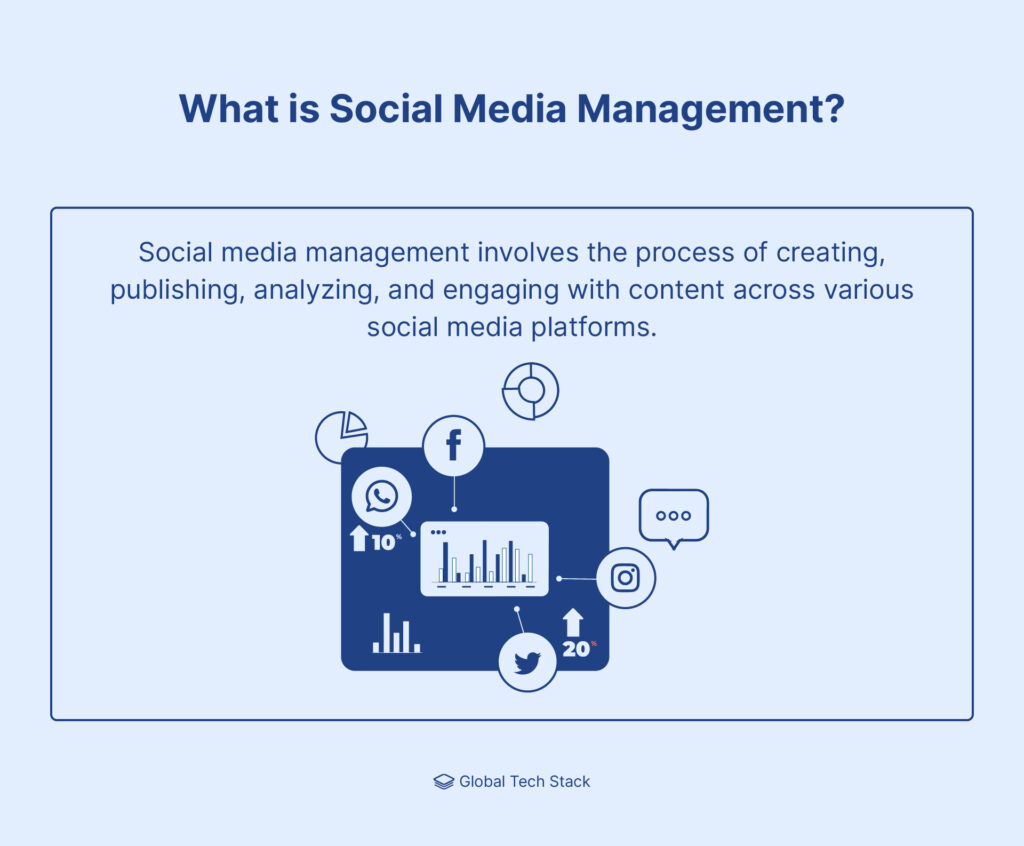|
Getting your Trinity Audio player ready...
|
Social media has become an integral part of our daily lives. Whether connecting with other brands, staying updated with the latest news, or promoting businesses, social media management tools offer a wealth of opportunities.
Effectively managing a social media presence requires a social media management strategy, consistent efforts, and a deep understanding of the online landscape.
As a social media manager, you are in charge of building and executing strategies that will help your small business grow through various social channels.
You need to be able to both create effective campaigns that will attract new users and monitor existing accounts to ensure that all content is up-to-date and accurately reflects your brand.
With the growing demand for social media management, it is essential for managers to have sufficient knowledge and the social media skills/et to bring results quickly.
In this blog, we will explore what social media management entails and provide you with the knowledge and tools to confidently navigate the changing world of social media management.

Managing social media involves the process of creating, publishing, analyzing, and engaging with content across various social media platforms.
It encompasses managing social media profiles, creating compelling content, building and nurturing online communities and monitoring brand reputation.
It aims to establish a strong online presence, to increase brand awareness and visibility, engage with the target audience, and drive desired outcomes.
Social media management includes:
Creating a social media content management strategy
Online reputation management
Social community management and Programming
Paid social media strategy
Team management and development
It also enables companies to engage customers by proactively responding to them on social media platforms as well as efficiently managing and publishing content.
By optimizing strategies for bottom-of-the-funnel conversions these tasks will help create a passionate following of supporters around your brand, increasing their engagement rates and making sure you reap the rewards of your great performance levels on social media platforms.
What is Social Media Management?
Social media management is the ongoing process of creating, scheduling, analyzing, and engaging with content posted on social media platforms.
It involves managing a brand’s online presence across various social media channels to achieve specific marketing and communications objectives.
Social media management is an essential piece of brand awareness for businesses and individuals looking to build and maintain a strong online presence.
It requires combining creativity, strategy, and analysis to be successful.
How to Manage Social Media Profiles
Managing social media profiles effectively requires a systematic approach that combines creativity, strategy, and analysis. To optimize your brand’s online presence across various social media platforms, it’s essential to focus on the following key areas:
Profile Optimization: Ensure that your social media profiles are complete and up-to-date. This includes selecting the right profile picture and cover image, writing an engaging and informative bio, and providing accurate contact details.
Consistent Branding: Maintain a consistent brand voice and visual identity across all platforms. This helps in reinforcing your brand’s message and making it easily recognizable to your target audience.
Content Strategy: Develop a content strategy that aligns with your business objectives and resonates with your audience. This involves creating a content calendar, scheduling posts, and ensuring a mix of engaging content types such as images, videos, and articles.
Engagement and Community Building: Actively engage with your audience by responding to comments, messages, and mentions. Building a strong community around your brand fosters loyalty and increases brand visibility.
Analytics and Monitoring: Regularly monitor your social media performance using analytics tools. Track key metrics such as engagement rates, reach, and follower growth to assess the effectiveness of your strategies and make data-driven decisions.
Adaptability and Trend Awareness: Stay updated with the latest social media trends and platform features. Being adaptable allows you to leverage new opportunities and keep your social media efforts fresh and relevant.
By focusing on these aspects, you can effectively manage your social media profiles, enhance your brand’s online presence, and achieve your marketing goals.
Social Media Planning
Social media planning and content creation are vital components of a successful social media strategy.
This process involves developing a comprehensive plan that aligns with your business objectives and resonates with your target audience across various social media platforms.
Social Media Planning
Effective social media planning starts with setting clear goals and objectives. These could range from increasing brand awareness and engagement to driving website traffic or generating leads.
Once goals are established, it’s essential to conduct a social media audit to assess your current social media presence and identify areas for improvement.
Selecting the right social media platforms is crucial, as each platform has its unique audience and features. Understanding where your target audience spends their time will help you focus your efforts on the most relevant channels.
A content calendar is an invaluable tool for organizing and scheduling posts, ensuring a consistent and strategic approach to content distribution.
Social Media Content Creation
Creating engaging and relevant content is at the heart of social media success. Content should be tailored to the interests and preferences of your target audience while reflecting your brand’s voice and values.
A mix of content types, such as images, videos, articles, and interactive posts, can help keep your audience engaged and interested.
Utilizing social media analytics tools can provide valuable insights into what types of content resonate most with your audience. These insights can guide future content creation efforts and help refine your social media strategy over time.
By combining strategic planning with creative content creation, businesses can build a strong social media presence, engage their audience effectively, and achieve their marketing goals.
How you Can Use Social Media Management
Team Member Management
Effective team member management is crucial for a successful social media strategy. It involves coordinating tasks, setting clear objectives, and fostering collaboration among team members.
Utilizing project management tools can help streamline workflows, ensuring everyone is aligned with the social media goals and objectives.
Reputation Management
Reputation management is a key aspect of social media management, focusing on maintaining and enhancing a brand’s image online.
This involves monitoring social media channels for mentions, responding to feedback, and addressing any negative comments promptly.
A proactive approach to reputation management can help build trust and credibility with your audience.
Customer Care
Providing excellent customer care on social media platforms is essential for building strong relationships with your audience.
This involves promptly responding to inquiries, addressing concerns, and offering support. Effective customer care can lead to increased brand loyalty and positive word-of-mouth.
Influencer Marketing
Influencer marketing is a powerful strategy to amplify your brand’s reach and credibility.
By partnering with influencers who align with your brand values, you can tap into their audience and gain access to potential customers.
Successful influencer collaborations can boost brand awareness, drive engagement, and increase conversions.
Paid Social Media Ads
Paid social media ads are an effective way to reach a larger audience and achieve specific marketing goals.
By leveraging the targeting capabilities of platforms like Facebook, Instagram, and LinkedIn, you can deliver tailored content to your desired audience.
Paid ads can help increase brand visibility, drive website traffic, and generate leads.
Social Media Community Management
Social media community management focuses on building and nurturing a loyal audience around your brand. This involves engaging with followers, facilitating discussions, and fostering a sense of community.
A strong community can enhance brand loyalty and provide valuable insights into customer preferences and behaviors.
Additional Social Media Management Resources
To stay ahead in the ever-evolving social media landscape, it’s important to leverage additional resources.
These may include online courses, webinars, industry blogs, and networking groups. Staying informed about the latest trends and best practices can help refine your social media strategies and achieve better results.
The Ever-Changing Landscape of Social Media Management
The evolution of the social media advertising and management within the dynamic social media landscape has been a fascinating journey, closely intertwined with the rapid advancements in technology and the changing behaviors of internet users.
Let’s take a closer look at how social media management has evolved over the years:
The emergence of Social Media Platforms
The initial phase of social media management coincided with the rise of platforms like MySpace, Friendster, and LinkedIn.
Brands and individuals began exploring these platforms as a means to connect and share information. However, the focus of social media trends during this period was primarily on personal profiles rather than brand presence.
Transition to Brand Engagement
As platforms like Facebook and Twitter gained popularity, brands recognized the potential for engaging with their target audience directly.
Social media management started shifting toward creating dedicated brand pages and engaging followers through content, contests, and promotions. The emphasis was on building a community of loyal customers and fostering customer relationships.
Additionally, social media listening and listening plays a crucial role in understanding customer sentiments and trends, enabling brands to engage effectively and respond to emerging trends.
Rise of Visual Content Creation and Influencer Marketing
The evolution of social media management witnessed a shift toward visual content with the emergence of platforms like Instagram and Pinterest.
Brands started leveraging these visually-oriented platforms to tell their stories and showcase their products or services creatively.
Additionally, influencer marketing became a prominent strategy, with brands partnering with influential individuals to amplify their message for increased brand awareness and reach a larger audience.
Real-Time Engagement and Customer Service
With the advent of platforms like Snapchat and Periscope, social media management took on a more immediate and real-time nature.
Brands started leveraging live video streaming to connect with their audience, show content calendar provide behind-the-scenes glimpses, and host live events.
Social media became a powerful tool for customer service, enabling brands to address queries and concerns promptly.
Content Personalization and Targeting
The evolution of social media management brought forth the era of personalized content and targeted advertising.
Platforms like Facebook and Instagram introduced advanced targeting options, allowing brands to reach specific demographics based on user interests, behaviors, and demographics.
Social media management strategies began focusing on data-driven audience insights to deliver tailored content to the right audience.
Integration of Social Media with Business Goals
Social media management evolved from being primarily a brand awareness tool to a crucial component of overall business strategies. It became intertwined with marketing, customer service, sales, and even product development.
Brands started measuring the impact of social media efforts through metrics like conversions, lead generation, and customer retention.
To be a successful social media manager, it is essential to possess data analytics skills to measure the performance of social media strategies, assess campaign effectiveness, and make informed decisions for future optimizations of social media calendar.
Integration of Artificial Intelligence (AI), Chatbots, and Social Media Management Tools
The integration of AI technologies into social media management brought about new opportunities for automation and enhanced customer experiences.
Chatbots became a common feature, enabling brands to provide instant responses, automate repetitive tasks, and gather valuable customer insights.
AI-powered tools also helped with sentiment analysis, content recommendations, and performance optimization.
Focus on Authenticity and Meaningful Engagement
In recent years, social media management has shifted toward fostering authentic connections and meaningful engagement potential customers.
Brands are focusing on building trust, transparency, and purpose-driven messaging. Influencer marketing has also evolved to prioritize long-term partnerships with influencers who align with a brand’s values.
The Growing Influence of Video Content
Video content has emerged as a dominant form of communication on social media platforms.
Short-form videos on platforms like TikTok and Reels, as well as live streaming on platforms like YouTube and Twitch, have become integral to social media management strategies.
Brands are leveraging video to engage and entertain their audience in innovative ways.
Embracing New Platforms and Formats
As social media continues to evolve, social media managers need to stay adaptable and embrace emerging platforms and formats.
Whether it’s the rise of Clubhouse and audio-based platforms, the integration of e-commerce functionalities on many social media platforms, or the increasing popularity of augmented reality (AR) and virtual reality (VR), social media management must evolve to incorporate these new avenues for engagement.
Social media management has transformed from a means of personal connection to a vital component of brand strategy. It has evolved to encompass various aspects, including community building, social media content creation itself, influencer partnerships, customer service, data analytics, and integration with broader business objectives.
Staying abreast of the latest industry trends, and technologies will continue to be essential for effective social media management in the future.
But, how do you go about managing your brand’s social media accounts?
The Role of a Social Media Manager
A social media manager is an individual responsible for providing voice and content for a brand on social networks.
They are responsible for responding to comments, social media content management, and keeping up to date with trends on social media. Social media managers look for opportunities to increase brand exposure for their brand or organization.
Daily tasks of a social media manager include responding to comments, creating content, and keeping up to date with trends on the social network and media. Many times, a social media or digital marketer also studies and works within digital marketing.
How to Manage Social Media Profiles
Managing social media profiles effectively requires a systematic approach. It involves optimizing profiles with relevant information, creating a consistent brand voice, and ensuring regular updates. Using tools to schedule posts is crucial for efficient content distribution and helps in managing multiple social platforms simultaneously.
Key aspects of profile management include choosing the right profile picture and cover image, writing engaging and informative bio sections, write posts, scheduling posts, creating social media posts, and providing contact details.
Additionally, keeping a close eye on social media reports, user engagement, responding to comments, and monitoring analytics is crucial for maintaining an active and vibrant social media presence.
If you’re uncertain about how to improve your social management strategy, there’s no need to be concerned. There is often confusion among marketers regarding this matter. To ensure a successful beginning of social strategy, it is recommended to complete three essential tasks.
Conduct a social media audit
Choose the appropriate social media platforms.
Assess the intended audience.
Completing them will provide fundamental information for steering social media marketing efforts in the right direction. By doing so, you can allocate your resources towards effective social media planning campaigns and strategies and reduce investment in ineffective ones.
Some of the main activities involved to manage your social media presence.
Social Media Management Software and Scheduling Tools
Social media management and scheduling tools are essential for streamlining your social media efforts. These tools allow you to plan, create, and schedule posts across various platforms, ensuring consistent and timely content delivery.
Social media management software are tools that help businesses and individuals manage their social media presence across multiple platforms.
These tools provide features such as social media scheduling, analytics, team management, and content creation.
In the ever-evolving social media landscape, having the right social media management tools can make all the difference in streamlining your social media marketing efforts.
These tools help manage your social media presence effectively across various platforms by offering features like scheduling posts, content creation, analytics, and social listening.
Some of the best social media management tools include:
Buffer: Known for its user-friendly interface, Buffer’ social media management tool allows you to schedule posts, analyze performance, and manage multiple social media accounts effortlessly.
Hootsuite: A comprehensive tool that offers scheduling, analytics, and team collaboration, making it ideal for businesses of all sizes looking to enhance their social media strategies.
Sprout Social: This social media management tool tool provides in-depth analytics, social listening, and customer relationship management features, helping brands engage with their target audience more effectively.
Loomly: Perfect for content creation and collaboration, Loomly offers tools for scheduling posts and generating content ideas based on social media trends.
SocialPilot: A cost-effective solution for managing multiple clients, SocialPilot is the best social media management tool for small businesses to schedule post offers scheduling, analytics, and team collaboration features, making it a favorite among social media managers.
Sendible: Designed for agencies, Sendible integrates with various social media platforms, offering features like scheduling, analytics, and social listening to increase brand awareness and visibility.
Each social and platform features a social media management tool has its unique features and pricing plans, making it essential to choose the right tool that suits your social media needs. Social media scheduling tools make it easier to schedule social media posts.
Analytics and Insights
Analytics and insights are crucial components of successful social management. They provide valuable insights and data on the performance of social media strategies, helping businesses and individuals understand what works and what doesn’t.
Social media analytics tools offer features such as engagement tracking, audience demographics, and content performance analysis.
By interpreting analytics data, social media managers can assess the effectiveness of campaigns against key metrics, identify trends, and make data-driven decisions to optimize future content and strategies.
Navigate the Changing World of Social Media Management with Confidence
The world of social media management is constantly evolving, with new platforms, features, and trends emerging regularly.
To navigate this dynamic environment with confidence, it’s essential to stay adaptable, continuously learn, and embrace innovation.
By doing so, you can effectively manage your social media presence and drive business success.
FAQs
Q: What is social media management?
Social media management involves creating, scheduling, analyzing, and engaging with content across social media platforms to achieve marketing and communication objectives.
Q: How can I become a social media manager?
To become a social media manager, develop skills in creation of content, analytics, and social media strategies. Gain experience through internships, courses, and managing social media accounts.
Q: How much do you pay a social media manager?
The salary of a social media manager varies based on experience, location, and company size. On average, social media managers earn between $40,000 and $70,000 annually.
Q: What tools do social media managers use?
Social media managers use tools like Buffer, Hootsuite, Sprout Social, and Canva for scheduling, analytics, content creation, and social listening.
Q: Why is social media management important for businesses?
Yes its important for businesses as it helps increase brand awareness, engage with the target audience, drive website traffic, and achieve marketing goals.







